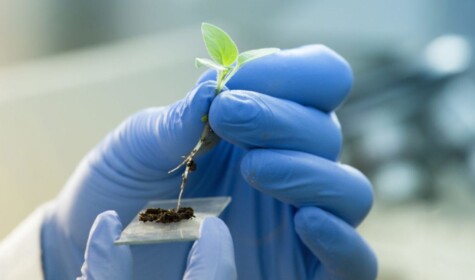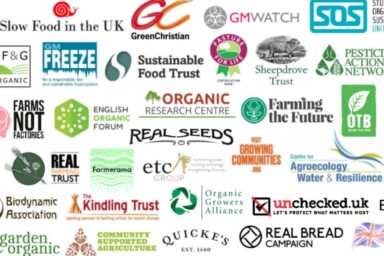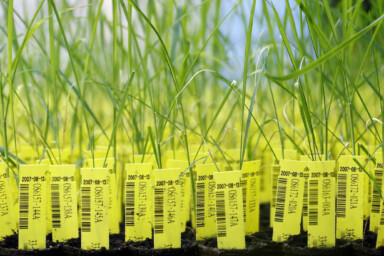My existing concerns about the increasing likelihood that gene editing will be made legally acceptable in the UK, once the current consultation is concluded, were substantially reinforced after I listened to last week’s BBC Food Programme. In this broadcast, Dan Saladino interviewed three people, all individuals whose views I much respect: Guy Singh-Watson, founder of the Riverford organic box scheme; Philip Lymbery, Global CEO of Compassion in World Farming (CIWF) and Lawrence Woodward, formerly Director of the Organic Research Centre and now founder of Beyond GM. Each conceded that there could be circumstances where gene editing might convey advantages; Guy Singh-Watson‘s example was potato blight, Philip Lymbery’s was genetically determined female chicks of egg-laying hens and Lawrence Woodward’s was conventional farmers planting crops with gene edited resistance to pests and diseases, thereby reducing use of chemical pesticides.
In a previous comment, I outlined my key concerns about gene editing – that its introduction would likely perpetuate the catastrophic decline in agricultural biodiversity which has been a feature of my whole farming life (now spanning 50 years); that it effectively overlooks and eclipses existing evolutionary responses which are now beginning to be understood by science, namely epigenetics which is the capacity of all living organisms to constantly adapt to the environment in which they live through subtle changes in gene expression at a cellular level. Lastly, it risks reinforcing the hubristic attitude of the science community that, now we understand the genome, we should feel at liberty to develop ‘designer’ plants and animals to suit the purposes of humanity without any respect for our, as yet partial, understanding of the miraculous evolutionary processes in the natural world, which we have all but eliminated in agriculture through intensification.
Now let me turn to a critique of the three claims by the Food Programme interviewees. Firstly, on potato blight, I would have thought that Guy Singh-Watson of all people should know that there are now plenty of potato varieties which have been conventionally bred to achieve high levels of blight resistance. I grew one of them on my farm last year and had no significant losses even though blight does eventually strike, albeit very late in the day.
I understand why Philip Lymbery could see the potential value of gene editing in not needing to kill the billions of male chicks of egg laying chickens – but surely a better way forward would be to breed dual purpose chickens, where the male chicks could be reared for meat? Better still is to phase out all industrial poultry production altogether, as it has such horrendous impacts on many grounds – welfare, greenhouse gas emissions from the crops grown for feed, antibiotic resistance, and the list goes on.
Finally, Lawrence Woodward, another good friend of mine whose views I much respect. I must say I was surprised that he is suggesting that conventional farmers would benefit from gene editing crops to reduce their use of pesticides. Surely he of all people should know from experience that farmers can avoid the need for any pesticide application if they switched to biologically-based soil fertility building.
So, what is my attitude towards finding that these three influential and respected friends of mine are, in my view, treating the symptoms not the cause of the problem? Well, it certainly doesn’t undermine the respect I feel towards them, but I have to say it does worry me profoundly that their tacit acceptance that there might be cases where this technology would be of benefit, might well be used to justify those pushing the legislative change through parliament.
Given the fact that the front line of biodiversity protection is no longer in rainforests or even other wilderness areas but actually on farms, gene editing is almost certain to perpetuate the century-long descent away from farming in harmony with nature to re-designing the plants and animals that we eat to suit our own short-term advantages. The huge tragedy here relates to us not realising that what we do to nature, we do to ourselves.
If we strip plants of their natural capacity to develop and maintain the positive health which equips them to withstand pest and disease challenges, in the end we will be on the losing side. This relates to the critical absence of a proper understanding of the concept of positive health. Health is not merely the absence of disease but, quite to the contrary, a positive step when an organism, whether it is a plant, an animal or a person, has the capacity to confront a pest or disease threat and overcome and stay healthy due to the strength of its immune system.
Adopting this viewpoint of positive health brings a profound shift and understanding of disease. Sir Albert Howard, an eminent British scientist and an expert on plant diseases, first framed this definition back in the 1940s. Farmers should regard pests, diseases and parasites as nature’s ‘professors of good husbandry since they reveal our management deficiencies’. The principle behind this simple observation goes right to the heart of the systemic ignorance which is embedded in the current scientific orthodoxy, the medical profession, the National Health Service and the plant breeding and veterinary communities, all of which regard health as simply the absence of disease.
Of course, there are many examples of diseases, including the current COVID-19 pandemic, where the naivety of our immune system necessitates intervention. In such circumstances, it is logical, and I believe sensible, to intervene – I had my first COVID vaccination last week. But whilst it is one thing to artificially mobilise one’s immune system to ensure immunity against a novel disease threat, it is quite another to gene edit a whole species of plants or animals to make them resistant to a disease when the vulnerability that is being treated was almost certainly the consequence of inappropriate management or nutrition, both of which are problems of modern intensive farming practices.
If we go down this path, we will further compromise the health of the next generation, leaving us ever more vulnerable to future pandemics. It is a classic case of treating the symptom, not the cause – which I think is the common feature of all three of my good friends’ suggested interventions. So, to everyone reading this, including my colleagues who were interviewed on the Food Programme, please regard this as an open invitation to enter into an ongoing discussion with us! We would also be interested in convening a zoom call on this specific theme if we get positive feedback from this article and would be delighted to include critics as well as advocates of the views I have expressed.
Click here for more on gene editing and the SFT’s consultation response.
Photograph: Jevtic






